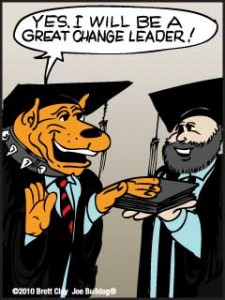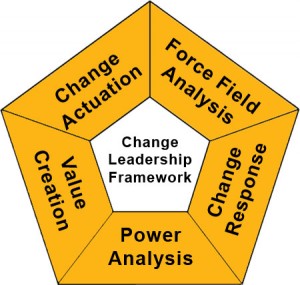
PhD?
Well, it’s official. I’m now a PhD student in the school of Human and Organizational Development at Fielding Graduate University. I’m sure you are thinking the same question my wife asked: “Why Do You Want to Get a PhD?” Follow-up question: “Are you crazy?” As you can imagine, I’ve thought a lot about this question. So, I’d like to share a few of those thoughts.
Before I answer the question, though, I need to clarify a point about the question itself. I’m not getting a PhD, no more than a medical doctor, gets a medical degree, or an attorney gets a law degree. The faculty stresses they are assisting us to become PhDs—that is a scholar who has the doctoral competencies to develop new knowledge and engage in scholarly discourse within the academy. Dictionary.com defines academy as “a group of authorities and leaders in a field of scholarship, art, etc., who are often permitted to dictate standards, prescribe methods, and criticize new ideas.” I doubt you’d want to be diagnosed and treated by a doctor who got his MD, but didn’t become a doctor. So, I am on a journey to become a PhD in the field of human and organizational development. If I have the honor of you becoming my client, you’ll know that when I diagnose an organization in your company (aka perform a “needs assessment”) and suggest treatment (aka “solution proposal”), you can expect I’ll be employing a certain level of competency, expertise, and professionalism.
So, back to the question, “Why do I want to become a PhD?”
Life-Long Learning.
 First and foremost, I highly value life-long learning. I subscribe to the notion that learning and growing are life-giving. Besides, not only is continual learning fulfilling, as a practical matter, it is a requirement for remaining competitive in a global, technology-enabled economy. How about you? Becoming a PhD might be a little extreme, but are you currently learning a new skill? Tomorrow can’t wait.
First and foremost, I highly value life-long learning. I subscribe to the notion that learning and growing are life-giving. Besides, not only is continual learning fulfilling, as a practical matter, it is a requirement for remaining competitive in a global, technology-enabled economy. How about you? Becoming a PhD might be a little extreme, but are you currently learning a new skill? Tomorrow can’t wait.
Practice and Scholarship.
I have found that practice is not optimal without theory. Wandering through life and business relying only on trial-and-error as the primary method of learning just isn’t optimal. It is true that smart managers can improvise their way through business situations and rise to the highest levels of management. But, how much more effective could they have been with additional tools, training, and coaching? The doctoral program I’m pursuing employs a scholar-practitioner model. As scholar-practitioners, we are not only conducting new research to expand the body of knowledge, but also, we are focusing on bringing new knowledge into practice. How about you? How can you bring new knowledge to what you do?
Better Work.
I have been researching what I call “the psychology of change” for the last five years and have written two books on it. Of course, I could continue that research outside of a research institution and it would be fine work. There are countless successful business authors and consultants who don’t have PhDs. Indeed, without a PhD my last book, Selling Change, won 11 awards including “Best Business Book of 2010”. But, how much better will my work be, how much better informed will it be, how much better will my skills and knowledge be, with the guidance of my faculty who are leading scholars and researchers from institutions such as University of Chicago, Case Western Reserve University, Harvard, George Mason, and others? In my experience the answer is: much better. Great work is never a solitary effort, but rather a collaboration of smart people, each contributing great ideas. How about you? You may not want to become a member of a research institution, but when is the last time you went to your professional society or alumni association meeting? Are you maintaining your professional network? How else can you collaborate with others?
Unique Contribution.
I believe each of us has a unique perspective that we can contribute. In my case, I’m an electrical engineer with business school training, many years of management experience, and deep expertise in marketing and sales. I am bringing those technical skills from the hard sciences along with the soft skills from marketing, sales, and management to the interdisciplinary domain of human and organizational development. That experience has also provided a unique lens through which I have observed organizational dynamics and human behavior. Everyone has a unique perspective they can contribute to their team. What is yours? What are the unique perspectives of the other people on your team?
Change Leadership Framework®.
 So, what will I study? What will be my unique contribution? Here’s the answer in PhD lingo: I am studying the behaviors of people and organizations, because I want to discover what motivates them to adapt to or lead change; in order to help my readers and clients more effectively lead people to innovate and to take action. Specifically, my area of research will be related to the Change Leadership Framework®, which I summarize in my book, Selling Change.
So, what will I study? What will be my unique contribution? Here’s the answer in PhD lingo: I am studying the behaviors of people and organizations, because I want to discover what motivates them to adapt to or lead change; in order to help my readers and clients more effectively lead people to innovate and to take action. Specifically, my area of research will be related to the Change Leadership Framework®, which I summarize in my book, Selling Change.
How about you? What unique contribution can you make? What could you get passionate about? Writing a book might be a little extreme, but on the other hand it isn’t as extreme as it seems. Journaling is kind of like writing a book—and it’s a highly recommended practice. If you try journaling for a month and you don’t find new insights and happiness, you should check yourself into a hospital for clinical depression. Here’s a little article on journaling and you can find more resources by searching “journaling guide” on Amazon. http://www.lifehack.org/articles/lifestyle/6-ways-journaling-will-change-your-life.html
Crazy? Maybe!
So there you have it. There’s always more to the story, which I’ll put in other blog posts when I have time. But, that’s my main rationale. Embarking on a journey to become a PhD might be crazy. But, I can tell you that I am certainly intellectually stimulated, energized, and having fun. I will make every effort to take you along that journey and share what I learn!
…By the way, does having fun count as a good reason to want to become a PhD?








Congrats Brett… all the best in this endeavor.
Good luck with your studies. I took the same journey when I found my MBA getting dated, more so onn the theory side. Even today, I continue to be amazed in how much I missed during my studies, even though I was looking hard and digging deep! Let me know if you have any questions or need encouragement.